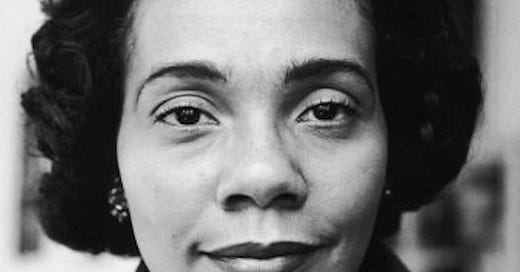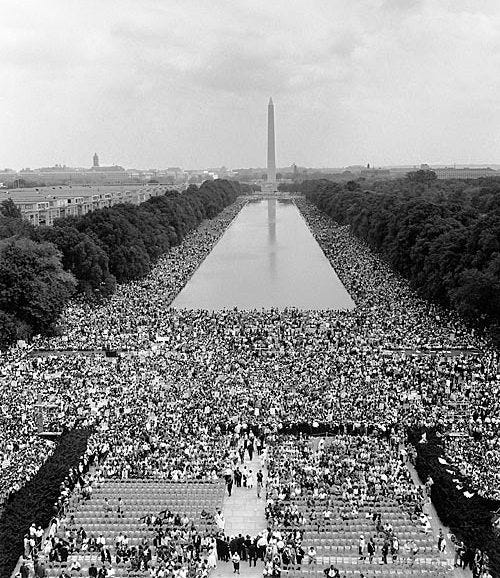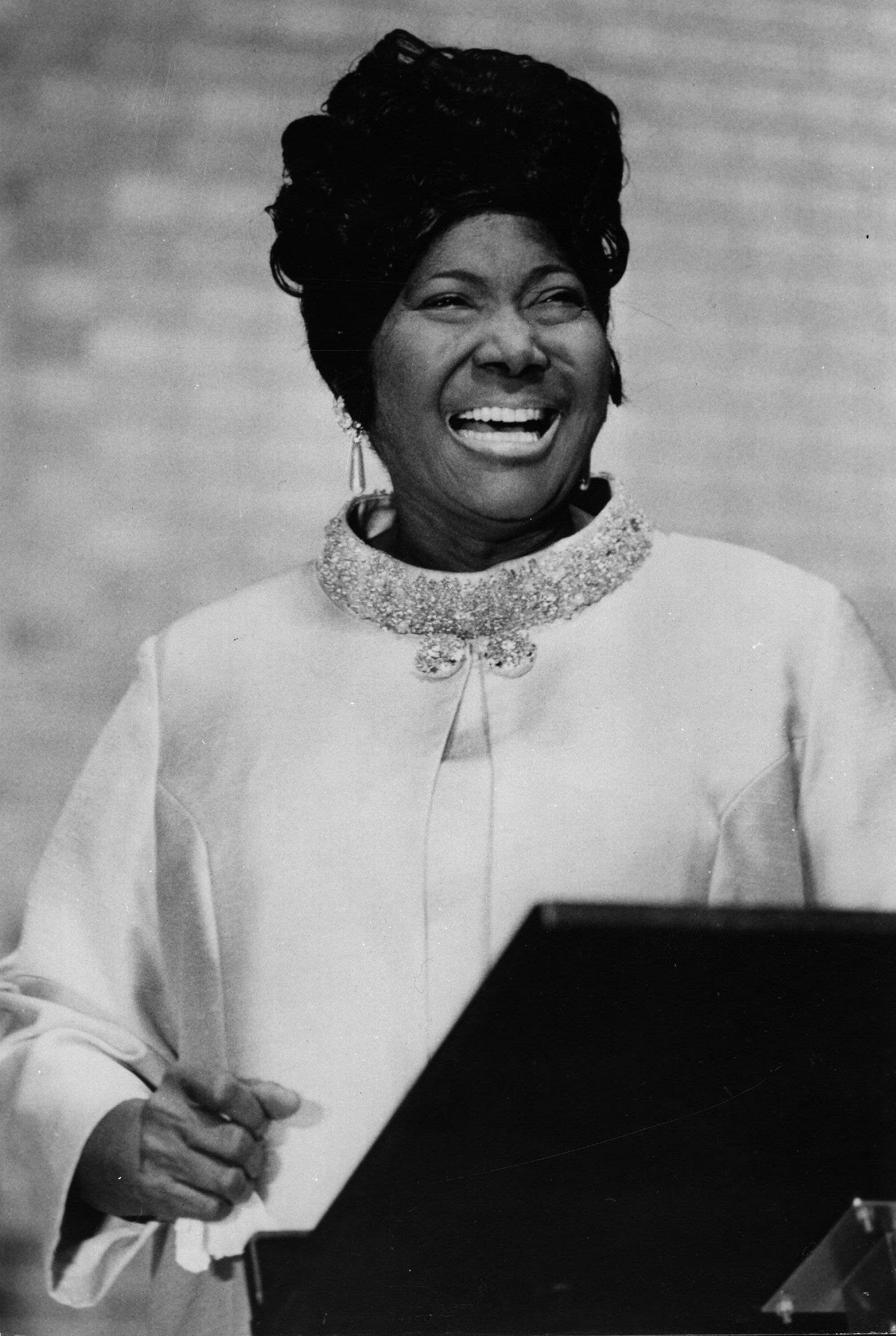"Not one of us can be spared the luxury of withdrawing from the arena of action,"
Coretta Scott King & Mahalia Jackson: quiet power behind greatness.

History is told by white men. By this I mean that white men run our world and thus decided what’s said. They are the overwhelming majority occupying every facet of power in the US: politics, business, medicine, law, criminal justice system, Hollywood and yes, publishing. This omnipresence means white men get to tell the story, dates, names and reasons. When we're young, we memorize these stories --facts, is how they're presented to us--and regurgitate them later on for a standardized test. After we've aged out of the school system, we read them in the newspaper or book. Or hear them on the radio, podcast or television show. Most of the time, though, no matter our age, we only get part of the story.
But as anybody who has ever watched a game of basketball knows, without a strong defense it doesn't matter if your star point guard never misses. Without workers hauling marble (or a patron for that matter), Michelangelo's genius doesn't matter. Someone has to be rinsing the brushes, minding children, editing the writing, cooking dinner, cleaning the toilets, ironing the uniform. Without this often invisible labor, the creator, architect, genius, activist, leader couldn't do what they do.
I like to talk about Coretta Scott King on the third Monday in January. Mrs King was one of those quiet, powerful helpers. Mrs King's influence began in the earliest days of her marriage and extended well after her husband's death. She was responsible for the lobbying of congress to create a federal holiday around her husband's birthday. This is something that her daughter, Bernice, has spoken extensively about this, although it is not well-known.
"She had a strategy around it. While Congressman Conyers was introducing legislation that continued to fail in the House, she was building up a groundswell of support in different cities and states across the nation, sending out letters to different municipalities and encouraging them to celebrate the King Holiday every year. So by the time the holiday actually passed as a federal holiday, many cities were already commemorating his birthday every year because of the efforts she made encouraging people to do that.”
But Mrs King also stepped in mere weeks after her husband's assassination to give speeches and talks in his place. She was just 41 with four young children at home when Dr King was murdered. Mrs King spoke out against the Vietnam War, years before her husband did. And at the height of the AIDS epidemic in 1983, Mrs King urged an amendment including gays and lesbians to the 1964 Civil Rights Act.
But twenty years earlier, Dr King is alive and in Washington DC. The Kings' friend singer Mahalia Jackson is on stage. A self-taught musician, Mahalia Jackson is often remembered more for her voice than her association with the civil rights movement. But Jackson often sang for free to support causes that were important to her, raising and giving money quietly. On August 28 1963, Jackson sings for about seven minutes, "I’ve Been Buked,"then "How I Got Over".
Roaring applause greets Jackson when she finishes. Jackson sings again, as King, the final speaker, takes the stage. King begins to speak. Like the rest of the 250,000 people in DC that day, Mahalia Jackson listens deeply. Jackson nods along but she is a performer and can read any audience. Something is missing. Jackson, sitting close by on the podium, calls out to King, loudly, "Tell them about the dream, Martin, tell them about the dream."
Dr King looks over at Mahalia Jackson. They link eyes for a moment. The next thing that happens is King pushing aside his prepared notes. He grabs the lectern with both hands and starts in on the theme that he'd shared only with his close circle. A dream of a new American dream.
The rest is history. The dream part of the speech is what most people know.
Sixty years later, it still feels hard to imagine: a nationally televised speech at the largest rally for human rights in US history, live in front of 250,000 people and someone, a Black woman, interrupts the speaker with advice to change direction. Right there, in the arena of action, Mahalia Jackson changes the course of history.
We need more of these stories.
Stories about quiet power.
Stories about following our intuition.
Stories about taking a risk.
But if you agree we need more stories, then you understand we need yours.
"not one of us can be spared the luxury of withdrawing from the arena of action,"
Don't panic!
Here's your ace: the only rule is that you share it with at least one person.
That's it.
Your story doesn't have to be perfect or even grammatically sound. It doesn’t even have to “have a point”.
It can be cupcake-sized, or much, much larger.
Because we desperately need stories that remind us that we're not in this life alone. That other people have our back. That smart advice from our right people, even when we're on the largest stage of our life, is always better than leaning on hope and luck. Or stories that evoke none of these things. Or offer a single petal, bruised pink, that sits on my heart.
The words don't matter as much as you telling it. Make the invisible, visible. Your story, the history that the white men won't tell. Can't say. Don't know. Your story, this world, now.
Tell it. I'm listening.
What I’m Reading:
I bumped “my 2024 reads and 5 ahead in 2025” for this post so stay tuned for all things bookish next week.
Recommended Links:
I can't think of anything better we could do today than support Black creators, immigrant entrepreneurs and those working behind the scenes in quiet power. Here are a few options:
A GoFundMe for a Black-owned, family run coffee shop in Altadena, CA that was destroyed by the Eaton fire.
Walltown Children’s Theater in Durham, North Carolina is hosting a Black History Month Talent Showcase that you can attend or donate money.
Artists Salomón and Anna lost their home and studio in the Eaton fire. You can support their GoFundMe here.
SHERo Mississippi helps “Black women, girls and femmes in Mississippi" get abortions and continue reproductive justice work.
Here’s a list of 30 books coming out this year by BIPOC authors that you can peruse or pre-order OR ask your library to order!
Please, if you liked any of the content above this link, click the heart icon to like it, share it on your social media or forward to a friend. Thank you!







What a lovely quote. Thank you for sharing ❤️